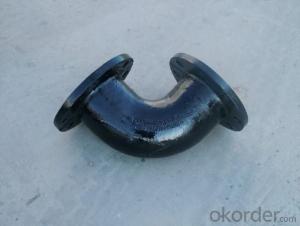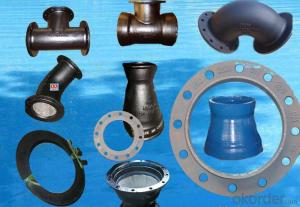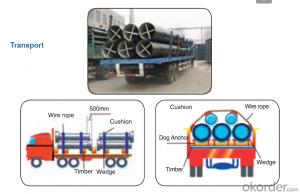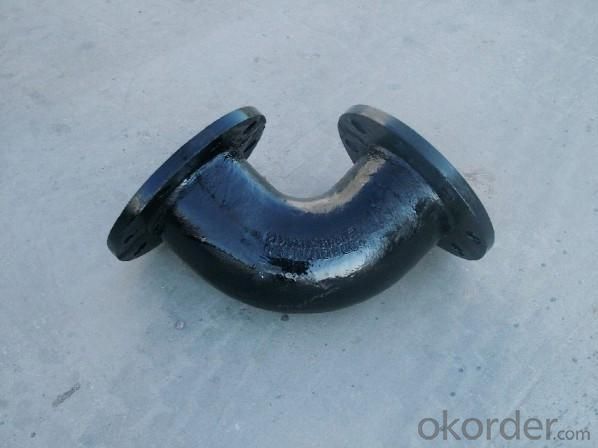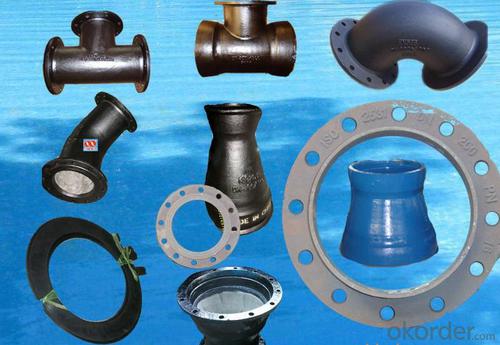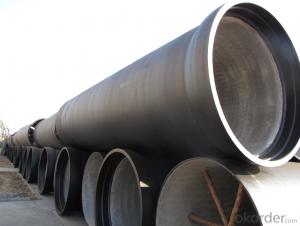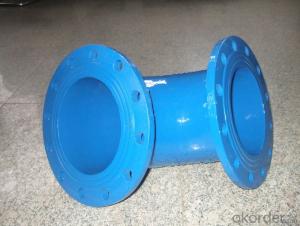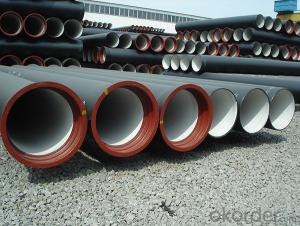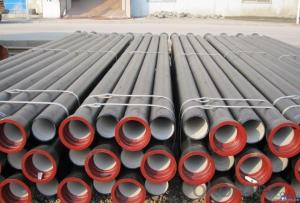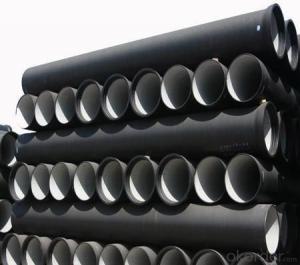Duct Iron Pipe DI Pipe ISO 2531 Double Socked 90° Bend T Type
- Loading Port:
- Tianjin
- Payment Terms:
- TT OR LC
- Min Order Qty:
- 100 m
- Supply Capability:
- 100000 m/month
OKorder Service Pledge
OKorder Financial Service
You Might Also Like
Ductile iron pipe fittings:
Dimensions standard:
ISO2531: 50-1000mm, PN10/16
BS4772: 50-1000mm, PN10/16
EN545: 50-1000mm, PN10/16
Connecting mode:
Flanged
Socketed
Mechanical connection
Loose flanged
Coatings:
Inner lined with cement and outside coated with zinc plus bitumen
Inner and outside coated with epoxy resin
Inner and outside coated with fusion bonded epoxy resin
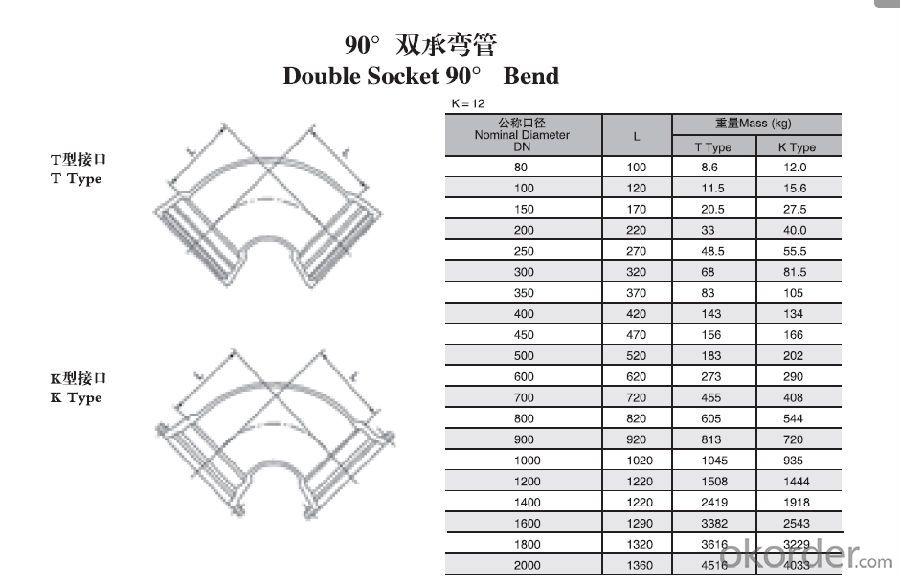
Quality:
ISO 2531 or EN 545 Standard K9 Class, K12 Class
1. ISO 9001 Certificate
2. ISO 2531 & EN 545 Certificate
3. WRAS Potable Water Certificate for FBE Internal Lining
4. WRAS EPDM Rubber Gasket or NBR Rubber Gasket
5. DN80mm - DN2000mm
6. Black Bitumen or Blue FBE / Epoxy Coating
7. Lengh = 6m or cut into 5.6m, 5.7m, 5.8m
8. Client's Brand Customization Allowable
9. Container or Bulk Loading / Shipping
10.Delivery within one Month or According to Client's Order Quantity
11. Support Client or The Third Party Inspection before Shipment
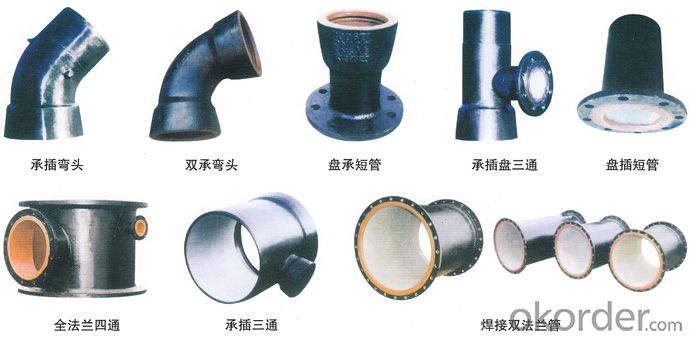
Transport:
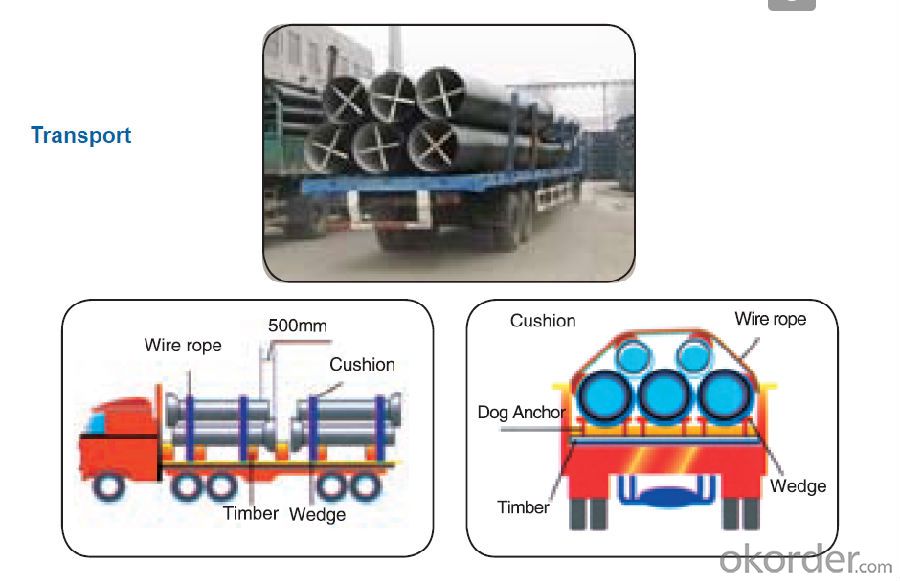
- Q: What is the minimum pipe diameter of cast iron pipe?
- According to the casting method, it is divided into continuous cast iron pipe and centrifugal cast iron pipe, in which the centrifugal cast iron pipe is divided into sand mould and metal type two kinds. Divided into gray cast iron pipe and nodular cast iron pipe according to different material. According to the interface form, it is divided into flexible interface, flange interface, self anchored interface, rigid interface and so on. Among them, the flexible iron pipes rubber sealing ring; flange interface cast iron pipe flange fixed in the rubber pad, the flange gasket sealing; rigid interface cast iron pipe socket is large, straight pipe is inserted, sealed with cement, this technology has been basically eliminated.
- Q: Can ductile iron pipe be used for directional drilling?
- Yes, ductile iron pipe can be used for directional drilling. It is a strong and durable material that can withstand the stresses and forces encountered during directional drilling operations. Its flexibility and resistance to damage make it a suitable choice for this application.
- Q: How do ductile iron pipes perform in seismic zones?
- Ductile iron pipes have proven to perform exceptionally well in seismic zones due to their unique characteristics and design features. These pipes are known for their ability to withstand ground movements, vibrations, and other seismic forces that may occur during an earthquake. The inherent flexibility of ductile iron pipes allows them to absorb and distribute the energy generated by seismic activities. This flexibility helps prevent the pipes from fracturing or breaking under intense ground shaking. Additionally, the high strength and resilience of ductile iron make it highly resistant to damage caused by ground movements. Furthermore, ductile iron pipes are designed with restrained joints, which provide added stability and resistance to seismic forces. These joints can accommodate small lateral movements without compromising the integrity of the pipeline system. The restrained joints also prevent the pipes from becoming disconnected or misaligned during seismic events, ensuring the continuous flow of water or other fluids. In seismic zones, where the ground is more prone to liquefaction or soil settlement, ductile iron pipes are often installed using methods that enhance their stability. For instance, the use of deep embedment techniques or the incorporation of thrust blocks at bends and fittings increases the resistance of the pipes to the lateral forces exerted by the ground. The performance of ductile iron pipes in seismic zones is further enhanced by regular inspection and maintenance. Periodic assessments can detect any potential weaknesses or damages that may have occurred during seismic events, allowing for timely repairs or replacements to be made. Overall, ductile iron pipes have a proven track record of reliable performance in seismic zones. Their flexibility, strength, and design characteristics make them highly resilient to seismic forces, ensuring the safe and uninterrupted supply of water or other fluids even in areas prone to earthquakes.
- Q: Can ductile iron pipes be used for underground slurry pipelines?
- Underground slurry pipelines can utilize ductile iron pipes, as they possess strength, durability, and resistance to corrosion, making them suitable for various applications. Their qualities make them reliable and cost-effective in transporting mixtures of solids and liquids over long distances. Ductile iron pipes can endure the abrasive nature of slurry and the external loads associated with underground installation, owing to their inherent toughness and flexibility. Moreover, they can be easily connected through different methods, ensuring a secure and leak-free pipeline system. Nonetheless, it is crucial to assess the specific properties of the slurry being transported and seek professional advice to determine the suitable pipe specifications and design considerations for the underground slurry pipeline.
- Q: Can ductile iron pipe be used for compressed air systems?
- Yes, ductile iron pipe can be used for compressed air systems. Ductile iron is known for its durability and high strength, making it suitable for handling the pressure requirements of compressed air systems. However, it is important to consider factors such as pipe sizing, pressure ratings, and compatibility with other system components to ensure safe and efficient operation.
- Q: What effect does magnesium play in nodular cast iron?
- Magnesium can be graphite precipitated in spherical form.But the specific mechanism is not clear, and now it is still debated in the academic circles.In addition, magnesium and sulfur generate MgS, which removes S from molten iron, which impedes the formation of spheroidal graphite.Therefore, Mg has two functions to eliminate the influence of S on Nodular Iron and promote the precipitation of graphite in spherical form.
- Q: Are ductile iron pipes resistant to chemicals or solvents?
- Ductile iron pipes possess a general resistance to a wide variety of chemicals and solvents. This resistance can be attributed to their composition, which consists of a high percentage of iron and carbon, as well as small amounts of other alloying elements like silicon, manganese, and magnesium. These alloying elements contribute to the overall strength and durability of the pipes, thereby making them highly resistant to corrosion and chemical attacks. However, it is important to acknowledge that the resistance of ductile iron pipes to chemicals and solvents may vary depending on the specific substance and its concentration. Certain aggressive chemicals or solvents, especially those with high levels of acidity or alkalinity, may gradually corrode or degrade the material of the pipes over time. In such instances, it is advisable to consult the pipe manufacturer or a professional engineer to ensure the compatibility of the pipes with the specific chemicals or solvents being used. Furthermore, the proper installation and maintenance practices are critical factors in preserving the chemical resistance of ductile iron pipes. Regular inspections, cleanings, and the application of protective coatings can assist in extending the lifespan and performance of the pipes when exposed to various chemicals or solvents.
- Q: Are ductile iron pipes suitable for wastewater systems?
- Indeed, wastewater systems can utilize ductile iron pipes. Ductile iron, renowned for its robustness and durability, exhibits resistance against corrosion and can endure the arduous conditions typically encountered in wastewater systems. Its exceptional tensile strength enables it to withstand the pressure and stress resulting from the movement of wastewater. Furthermore, the installation of ductile iron pipes is effortless, and their longevity ensures a cost-effective solution for wastewater systems. In conclusion, ductile iron pipes represent a dependable and appropriate choice for transporting wastewater in diverse applications.
- Q: Can ductile iron pipes be used for bridge crossings?
- Ductile iron pipes are indeed suitable for bridge crossings. This material is widely used in various applications, such as water and wastewater systems, due to its strength and durability. When it comes to bridge crossings, ductile iron pipes offer numerous advantages. They possess high tensile strength, enabling them to handle the load and stress imposed by the bridge structure. In addition, they are highly resistant to corrosion, making them well-suited for environments where bridges may be exposed to moisture and other harsh conditions. Moreover, ductile iron pipes have the capability to withstand seismic activity, making them a dependable choice for areas prone to earthquakes. Overall, ductile iron pipes are a reliable and appropriate option for bridge crossings due to their strength, durability, resistance to corrosion, and ability to withstand seismic activity.
- Q: How does ductile iron pipe handle ground movement and settlement?
- Ductile iron pipe is highly resilient and can effectively handle ground movement and settlement. Its flexibility and strength allow it to withstand external loads and pressure variations caused by ground shifts and settlement. The pipe's inherent ability to absorb and distribute stress ensures its stability, minimizing the risk of damage or failure due to ground movement. Additionally, ductile iron pipes are commonly installed with flexible joints that further accommodate ground shifts, providing a reliable and durable solution for underground applications.
Send your message to us
Duct Iron Pipe DI Pipe ISO 2531 Double Socked 90° Bend T Type
- Loading Port:
- Tianjin
- Payment Terms:
- TT OR LC
- Min Order Qty:
- 100 m
- Supply Capability:
- 100000 m/month
OKorder Service Pledge
OKorder Financial Service
Similar products
Hot products
Hot Searches
Related keywords
